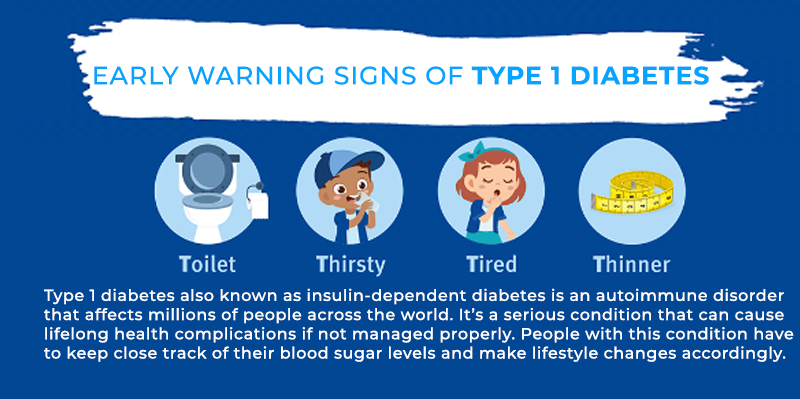Type 1 diabetes also known as insulin-dependent diabetes is an autoimmune disorder that affects millions of people across the world. It’s a serious condition that can cause lifelong health complications if not managed properly. People with this condition have to keep close track of their blood sugar levels and make lifestyle changes accordingly. It’s important to be aware of the early warning signs and diagnosis of this condition so that you can seek the right treatment and prevention.
Let’s discover Type 1 diabetes causes, early warning signs, and more about it:
Early Warning Signs:

The most common early warning signs of type 1 diabetes include:
1: Frequent Urination: People with this condition often urinate more than usual, due to their body’s inability to absorb glucose from the blood.
2: Excessive Thirst: People with such a condition tend to feel extremely thirsty as their body attempts to rehydrate itself from all the urination.
3: Weight Loss: Unexplained weight loss can be one of the early warning signs of this disease. This is because the body cannot process and use the glucose from the food eaten.
4: Fatigue: Constant fatigue, feeling tired always, can be a sign of this condition. This is because the body’s cells are unable to absorb the sugar they need for energy.
5: Blurry vision: High levels of sugar in the blood can cause blurred vision.
Type 1 Diabetes Causes:
The exact causes of diabetes are unknown, but it’s thought to be related to a combination of genetic and environmental factors. The most common type 1 diabetes causes include:
1: Family History: Research has shown that people who have a family history of type 1 diabetes are at higher risk for developing the condition.
2: Autoimmune Disorder: This condition is an autoimmune disorder, meaning that the body’s immune system mistakenly attacks healthy cells.
3: Viral Infection: Certain viral infections may trigger this condition in people who are susceptible to it.
When To See A Doctor?
If you think that you or someone you know may be experiencing the early warning signs of type 1 diabetes, it’s important to see a doctor as soon as possible. A doctor can help confirm a diagnosis and provide the necessary treatment and lifestyle changes that will help to manage this condition.
Diagnosis Of Type 1 Diabetes:
If you experience any of the early warning signs of type 1 diabetes, it’s important to seek medical attention as soon as possible. Your doctor will order tests to determine if you have it or not. These tests may include a fasting glucose test and an oral glucose tolerance test.
Diet For Type 1 Diabetes Patients:
For those living with type 1 diabetes, it is important to stick to a healthy and balanced diet that includes carbohydrates, protein, fat, and fiber. The focus should be on eating whole grains, fruits, and vegetables as well as lean proteins like fish and chicken. It’s also important to limit saturated fat, salt, and sugar intake. People with such ailments should also be mindful of their portion sizes, as overeating can lead to high blood sugar levels. Sticking to a healthy diet and making sure you get regular physical activity.
FAQs
What is type 1 diabetes?
Type 1 diabetes is an autoimmune disorder where the body’s immune system mistakenly attacks healthy cells, resulting in the inability to produce insulin. Insulin is a hormone that helps the body absorb and use the glucose from food for energy. Without insulin, the body’s cells cannot absorb the glucose they need for energy and the body begins to break down its own stored fat, resulting in weight loss.
Can a person with diabetic type 1 survive without insulin injection?
No, people with type 1 diabetes cannot survive without insulin injections. Insulin is a hormone that helps the body absorb and use the glucose from food for energy. Without insulin, the body’s cells cannot absorb the glucose they need for energy and the body begins to break down its own stored fat, resulting in weight loss. In order for a person with this condition to survive, they must inject insulin into their body on a regular basis.
As a type 1 diabetic, how can I gain weight?
If you are a type 1 diabetic, it can be challenging to gain weight because insulin injections help your body absorb and use the glucose from food for energy. However, it is possible to gain weight by increasing your caloric intake and exercising regularly. Eating a diet rich in carbohydrates, fats, and proteins can ensure that your body receives the calories it needs for weight gain.
